
After Tuesday's presidential election, Penn’s Leonard Davis Institute of Health Economics hosted a virtual seminar discussing potential changes in public health and healthcare legislation under President-elect Joe Biden's administration.
Titled “What’s Next for Health Care Reform?,” the event was moderated by David Grande, a professor at the Perelman School of Medicine and director of policy at the Leonard David Institute. The discussion featured Penn Law professor Allison Hoffman, Political Science professor Daniel Hopkins, and Mark Pauly, the Bendheim Professor and Professor of Business Economics and Public Policy at Wharton.
The Friday afternoon event was held on BlueJeans before former Vice President Biden and Sen. Kamala Harris (D-Calif.) won the presidency and vice presidency, respectively. The Biden-Harris ticket crossed the 270 electoral vote threshold on Saturday morning after Pennsylvania was called for the Democrats.
The speakers began by discussing the 2020 campaign and how the coronavirus pandemic made healthcare a top issue for voters.
“On some level, healthcare was on everybody’s minds,” he said. “This was a healthcare election, insofar as the coronavirus was one of the central issues.”
Although the results of the presidential and many congressional elections were unknown at the time of the event, the panelists considered the future of the Affordable Care Act, created under the Barack Obama administration in 2010, after the election. On Tuesday, the Supreme Court will hear a case challenging the constitutionality of the individual mandate, a provision of the ACA that requires Americans to either purchase insurance or face increased taxes.
Hoffman said the Court will seek to answer two questions: whether the individual mandate is constitutional, and whether or not the rest of the ACA can remain if the individual mandate is overturned.
Though the hearing is just days away, Hoffman does not anticipate the case to be decided in the near future.
“We will get some sense of [the ruling] based on the questioning on Tuesday, but I don’t think we’re likely to get a decision on the case until June,” she said.
The panelists explored the potential for healthcare reform under a Biden presidency, particularly a Biden administration with a Republican majority in the Senate. As of Sunday evening, Republicans and Democrats are projected to hold 48 seats each in the Senate, with the Alaska and North Carolina races yet to be called and the two Georgia races headed to runoff elections in early January 2021.
Pauly was skeptical about Biden’s ability to pursue healthcare reform without a Democrat-led Senate, adding that "the chances of legislative agreement on much of anything are pretty slim."
He said, however, that there could be effective policy change through executive avenues, noting that Biden may find success rolling back executive actions that Trump implemented.
“The basic problem is that American politics is super competitive right now,” Hopkins said.
While he did not predict that there may be large-scale change with a Biden administration, he said there could be promising incremental change produced by bipartisan negotiation.
The panelists also discussed the potential for significant changes in public health legislation in light of the COVID-19 pandemic under a Biden administration.
The panelists agreed that the issues of public health exacerbated by the pandemic will remain extremely important well into a Biden presidency. Hoffman said she thinks Americans will see the conditions of the pandemic grow worse into the winter, adding that Biden “will face a really tough situation that will take up a lot of his time in the early months, maybe years, of his presidency.”
The ability to affect national public health policy, Pauly said, depends on whether a potential Republican Senate majority will identify the pandemic as a public health issue or a policy issue, and whether they choose to follow the guidance of health officials, rather than health policy officials.
The crucial question moving forward, Pauly said, is “will [Republican lawmakers] go along with science, or will they continue to maintain a position based on no science, various conspiracies, [and] wishful thinking?"
The Daily Pennsylvanian is an independent, student-run newspaper. Please consider making a donation to support the coverage that shapes the University. Your generosity ensures a future of strong journalism at Penn.
Donate




